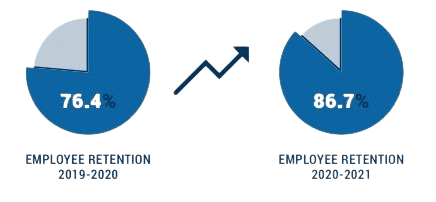
Exit Planning Institute (EPI) is the authority on exit planning and value acceleration. EPI began in 2005 as a professional education organization and launched the Certified Exit Planning Advisor (CEPA) credentialing program in 2007. Chris Snider and Scott Snider acquired EPI through their company, Snider Premier Growth in 2012. In 2013, Chris created the Value Acceleration Methodology, a clear process for managing exit planning engagements and leading diverse teams.
The Human Capital in EPI
Analyzing the Strengths and Weaknesses in EPI
Exit Planning Institute performed an enterprise value assessment to take a deep dive into measuring the 4 intangible capitals. Customer, Structural, Human and Social. From the assessment results, EPI chose to focus on Human Capital, specifically in 2020 and 2021.
This focus was sparked by a conversation between EPI CEO, Christopher Snider, and his son, EPI President, Scott Snider.
If you were to die tomorrow, what would happen to the operational functions of our business, the day-to-day processes, and the execution of our strategic growth strategy? Chris Asked
When scoring any of the 4Cs, the owner must look at it from a buyer’s perspective. Some items that a buyer would look at in regard to Human Capital may be:
- Skills and talent of the current team
- Tenure or retention rates
- Knowledge of product lines and customer base
- Employee engagement and satisfaction
- Ability to innovate
- Ability to communicate/create rhythm
- Core values
- Strength of management
- Ability to create and execute growth strategies
- Training and professional development programs
- Emotional intelligence
From a buyer’s perspective, EPI has a relatively young and inexperienced team in relation to the company’s aggressive growth strategy. EPI had a deep knowledge of the product lines and customer base and a strong ability to innovate and create plans. However, EPI had no formal executive leadership team and lacked a set of core values that the entire organization bought into. Additionally, no member of the team had ever experienced growing a company.
To improve value in the organization, EPI went to work to strengthen their people.
THE GOAL
EPI made a conscious decision to invest in their human capital to have immediate short-term results and long-term value growth. The goal was to improve the team’s collaboration, decision-making, and leadership while organizing the team formally. This would ultimately advance the value of Human Capital and provide immediate short-term wins.
EPI Strategy to Build Human Capital
In the past year, Exit Planning Institute invested over $160,000 in professional development programs, training, and team experiences. EPI also developed a formal executive leadership team of four people who work closely with President, Scott Snider. The leadership team then worked with an Entrepreneurial Operating System (EOS) Implementer and began to incorporate Gino Wickman’s EOS model into the business. This allowed the team to better communicate and better understand data at both the leadership team level as well as company-wide.
EPI continues to formally run and implement the Value Acceleration Methodology by conducting 90-day sprints, quarterly renewals, and annual retreats. These actions allow the team to develop a competency chart to grow key employees, identify critical future roles that would build value in the business, and elevate team members into the correct roles.
Company-wide, EPI leaders met with each individual at the company and created professional development plans specific to their needs and interests. The entire organization participated in transformational leadership training and a decision dynamics course. These two programs allow employees at all levels to communicate better together, collaborate more, and make quick, informed, and empowered decisions. EPI also developed an employee satisfaction survey that is released twice per year to gauge and understand how the employees are doing and how the culture is being developed.
The Results
As a result of the investment in their Human Capital, the Exit Planning Institute team collaboratively formed a new set of core values, determined a written three-year strategy, and voiced their mission, vision, and purpose. These investments also resulted in an increase in employee satisfaction, higher employee retention, and a better sense of creativity and innovation from the team.

4.74 OUT OF 6 EMPLOYEE SATISFACTION (APPROACHING BEST-INCLASS VALUES)

100% OF EPI TEAM RECEIVED A +5% RAISE

INTERNATIONALLY RECOGNIZED AS A GREAT EMPLOYER

4.74 OUT OF 6 EMPLOYEE SATISFACTION (APPROACHING BEST-INCLASS VALUES)
What Now?
After spending the last 18 months protecting the Human Capital value in the organization, EPI continues to build that value moving forward.
- Build value around the core team members with additional professional development opportunities
- Significantly build the executive leadership team’s knowledge around operating a high-growth entrepreneurial company.
- Increase implementation of new core values
- Increase frequency of collaborative training
EXIT PLANNING INSTITUTE, 2021.
*Case study results are for illustrative/informational purposes only and may not reflect the typical purchaser’s (client’s) experience and are not intended to represent or guarantee that anyone will achieve the same or similar results.
